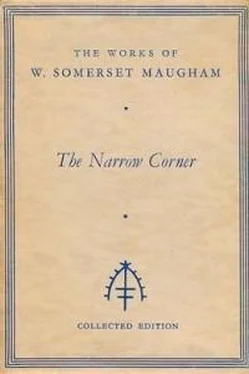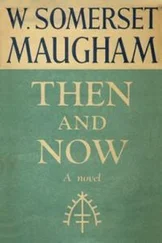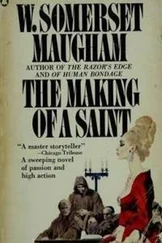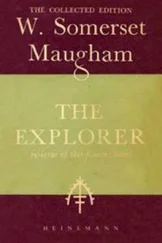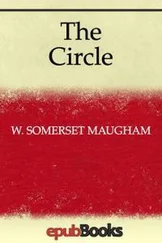“Have you any plan for the future?” he asked.
She shook her head.
“I can wait. I’m young. When grandpa dies this will be mine. Perhaps I shall sell it. Daddy wants to go to India. The world is wide.”
“I must go,” said Dr. Saunders. “Can I see your father to say good–bye to him?”
“I’ll take you to his study.”
She led him along a passage to a smallish room at the side of the house. Frith was sitting at a table littered with manuscripts and books. He was pounding a typewriter, and the sweat pouring from his fat red face made his spectacles slip down his nose.
“This is the final typing of the ninth canto,” he said. “You’re going away, aren’t you? I’m afraid I shan’t have time to show it you.”
He had forgotten that Dr. Saunders had fallen asleep while he was reading his translation aloud to him, or if he remembered was undiscouraged.
“I am nearing the end. It has been an arduous task, and I hardly think I could ever have brought it to a successful conclusion but for my little girl’s encouragement. It is very right and proper that she should be the chief gainer.”
“You mustn’t work too hard, daddy.”
“ Tempus fugit ,” he murmured. “ Ars longa, vita brevis. ”
She put her hand gently on his shoulder and with a smile looked at the sheet of paper in the machine. Once more the doctor was struck by the loving–kindness with which Louise treated her father. With her shrewd sense she could not have failed to form a just estimate of his futile labour.
“We haven’t come to disturb you, darling. Dr. Saunders wants to say good–bye.”
“Ah, yes, of course,” said Frith. He got up from the table. “Well, it’s been a treat to see you. In this backwater of life we don’t often have visitors. It was kind of you to come to Christessen’s funeral yesterday. We Britishers ought to stick together on these occasions. It impresses the Dutch. Not that Christessen was British. But we’d seen a great deal of him since he came to the island, and after all he belonged to the same country as Queen Alexandra. A glass of sherry before you go?”
“No, thank you. I must be getting back.”
“I was very much upset when I heard. The Contrôleur told me he had no doubt it was the heat. He wanted to marry Louise. I’m very glad now I wouldn’t give my consent. Lack of self–control, of course. The English are the only people who can transplant themselves to strange lands and keep their balance. He’ll be a great loss to us. Of course he was a foreigner, but all the same it’s a shock. I’ve felt it very much.”
It was evident, however, that he looked upon it as much less serious for a Dane to die than for an Englishman. Frith insisted on coming out into the compound. The doctor, turning round to wave his hand as he drove off, saw him with his arm round his daughter’s waist. A ray of sun finding its way through the heavy leafage of the kanari trees touched her fair hair with gold.
A MONTH later Dr. Saunders was sitting on the little dusty terrace of the van Dyke Hotel at Singapore. It was late in the afternoon. From where he sat he could see the street below. Cars dashed past and cabs drawn by two sturdy ponies; rickshaws sped by with a patter of naked feet. Now and then Tamils, tall and emaciated, sauntered along, and in their silence, in the quiet of their stealthy movement, was the night of a far–distant past. Trees shaded the street and the sun splashed down in irregular patches. Chinese women in trousers, with gold pins in their hair, stepped out of the shade into the light like marionettes passing across the stage. Now and then a young planter, deeply sunburned, in a double–brimmed hat and khaki shorts, walked past with the long stride he had learnt tramping over the rubber estates. Two dark–skinned soldiers, very smart in their clean uniforms, strutted by conscious of their importance. The heat of the day was past, the light was golden, and in the air was a crisp nonchalance as though life, there and then, invited you to take it lightly. A water–cart passed, slithering the dusty road with a stream of water.
Dr. Saunders had spent a fortnight in Java. Now he was catching the first ship that came in for Hong–Kong, and from there he intended to take a coasting vessel to Fu–chou. He was glad he had made the journey. It had taken him out of the rut he had been in so long. It had liberated him from the bonds of unprofitable habits, and, relaxed as never before from all earthly ties, he rejoiced in a heavenly sense of spiritual independence. It was an exquisite pleasure to him to know that there was no one in the world who was essential to his peace of mind. He had reached, though by a very different path, the immunity from the concerns of this world which is the aim of the ascetic. While, like the Buddha contemplating his navel, he was delectably immersed in his self–satisfaction, someone touched him on the shoulder. He looked up and saw Captain Nichols.
“I was passin’ by and saw you sittin’ there. I came up to say ’ow d’ye do to you.”
“Sit down and have a drink.”
“I don’t mind if I do.”
The skipper wore his shore–going clothes. They were not old, but they looked astonishingly seedy. He had two days’ growth of beard on his lean face, and the nails on his hands were rimmed with grime. He looked down at heel.
“I’m ’avin’ me teeth attended to,” he said. “You was right. The dentist says I must ’ave ’em all out. Says ’e’s not surprised I suffer from dyspepsia. It’s a miracle I’ve gone on as long as I ’ave, according to ’im.”
The doctor gave him a glance and noticed that his upper front teeth had been extracted. It made his ingratiating smile more sinister than ever.
“Where’s Fred Blake?” asked Dr. Saunders.
The smile faded from the skipper’s lips, but lingered sardonic in his eyes.
“Come to a sticky end, poor young chap,” he replied.
“What d’you mean?”
“Fell overboard one night or jumped over. Nobody knows. He was gone in the morning.”
“In a storm?”
The doctor could hardly believe his ears.
“No. Sea was as flat as a mill–pond. He was very low after we come away from Kanda. We went to Batavia same as we said we was goin’ to do. I suspicioned ’e was expectin’ a letter there. But if it come or if it didn’t I don’t know, and it’s no good askin’ me.”
“But how could he go overboard without anyone noticing? What about the man at the helm?”
“We’d ’ove to for the night. Been drinkin’ very ’eavy. Nothin’ to do with me, of course, but I tell ’im he’d better go easy. Told me to mind me own bloody business. All right, I says, go your own way. It ain’t goin’ to disturb my night’s rest what you do.”
“When did it happen?”
“A week ago last Tuesday.”
The doctor leaned back. It was a shock to him. It was so short a while since that boy and he had sat together and talked. It had seemed to him then that there was in him something naïve and aspiring that was not devoid of charm. It was not very pleasant to think of him now drifting, mangled and terrible, at the mercy of the tides. He was only a kid. Notwithstanding his philosophy, the doctor could not but feel a pang when the young died.
“Very awkward it was for me, too,” continued the skipper. “He’d won nearly all my money at cribbage. We played a lot after we left you, and I tell you the luck ’e ’ad was unbelievable. I knew I was a better player than ’im; I’d never ’ave took him on if I ’adn’t been as sure of that as I am that you’re sittin’ there, and I doubled the stakes. And d’you know, I couldn’t win. I began to think there was somethin’ phoney about it, but there’s not much you can teach me in that direction, and I couldn’t see ’ow it was done if it was done. No, it was just luck. Well, to cut a long story short, by the time we got to Batavia ’e’d took off me every penny I’d got for the cruise.
Читать дальше
Конец ознакомительного отрывка
Купить книгу
